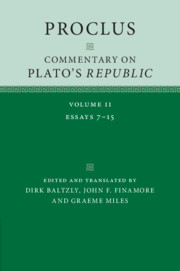Book contents
- Proclus
- Proclus
- Copyright page
- Dedication
- Contents
- Acknowledgements
- Note on the Text and Translation
- General Introduction
- On the Republic of Plato: Essays 7–15
- Introduction to Essay 7
- Essay 7 Proclus the Successor on the demonstrations in the fourth book of the Republic on the three parts of the human soul and the virtues that are 5 in them.
- Introduction to Essays 8 and 9
- Essay 8 236 Concerning the arguments in the fifth book of the Republic showing the virtues and education of men and women to be the same.
- Essay 9 251 An examination of the arguments of Theodore of Asine that render virtue the same for men and women and concerning what 5 Socrates said.
- Introduction to Essay 10
- Essay 10 258 On the discussion in the Fifth Book of the Republic demonstrating what kind the love of 5 learning of philosophers is, and what kind that of the majority.
- Introduction to Essay 11
- Essay 11 269On the Discussion in the Republic Demonstrating What the Good Is
- Introduction to Essay 12
- Essay 12 287On the Cave in the Seventh Book of Republic
- Introduction to Essay 13
- Essay 13 1 By Proclus the Lycian, Diadochus of the Platonic School
- Introduction to Essays 14 and 15
- Essay 14 81 On the Three Arguments Showing that the Just Life is Happier than the Unjust
- Essay 15 84The major sections of the Tenth Book
- References
- English–Greek Glossary
- Greek Word Index
- General Index
Introduction to Essay 13
from On the Republic of Plato: Essays 7–15
Published online by Cambridge University Press: 23 June 2022
- Proclus
- Proclus
- Copyright page
- Dedication
- Contents
- Acknowledgements
- Note on the Text and Translation
- General Introduction
- On the Republic of Plato: Essays 7–15
- Introduction to Essay 7
- Essay 7 Proclus the Successor on the demonstrations in the fourth book of the Republic on the three parts of the human soul and the virtues that are 5 in them.
- Introduction to Essays 8 and 9
- Essay 8 236 Concerning the arguments in the fifth book of the Republic showing the virtues and education of men and women to be the same.
- Essay 9 251 An examination of the arguments of Theodore of Asine that render virtue the same for men and women and concerning what 5 Socrates said.
- Introduction to Essay 10
- Essay 10 258 On the discussion in the Fifth Book of the Republic demonstrating what kind the love of 5 learning of philosophers is, and what kind that of the majority.
- Introduction to Essay 11
- Essay 11 269On the Discussion in the Republic Demonstrating What the Good Is
- Introduction to Essay 12
- Essay 12 287On the Cave in the Seventh Book of Republic
- Introduction to Essay 13
- Essay 13 1 By Proclus the Lycian, Diadochus of the Platonic School
- Introduction to Essays 14 and 15
- Essay 14 81 On the Three Arguments Showing that the Just Life is Happier than the Unjust
- Essay 15 84The major sections of the Tenth Book
- References
- English–Greek Glossary
- Greek Word Index
- General Index
Summary
Essay 13 is a wide-ranging commentary on the short speech of the Muses in Republic VIII 546a1–547a5 and 547b2–c4. Proclus names this essay after the bee, because bees are sacred to the Muses and display a kind of appropriately ruled society.1
Plato has just completed the central books of the Republic (V, VI, and VII), in which he has advocated that women should share the philosophical rule with men and has laid out the three famous analogies of the Sun, Divided Line, and Cave. He now embarks on the decline from the government of the ideal city through to four lesser forms: timocracy, oligarchy, democracy, and tyranny. The Muses’ speech explains the reasons behind the decline of the ideal city, stating that it occurs because of strife between the auxiliary and guardian classes after these two classes are no longer able to select the correct time for breeding the new generation.
- Type
- Chapter
- Information
- Proclus: Commentary on Plato's 'Republic' , pp. 189 - 201Publisher: Cambridge University PressPrint publication year: 2022

